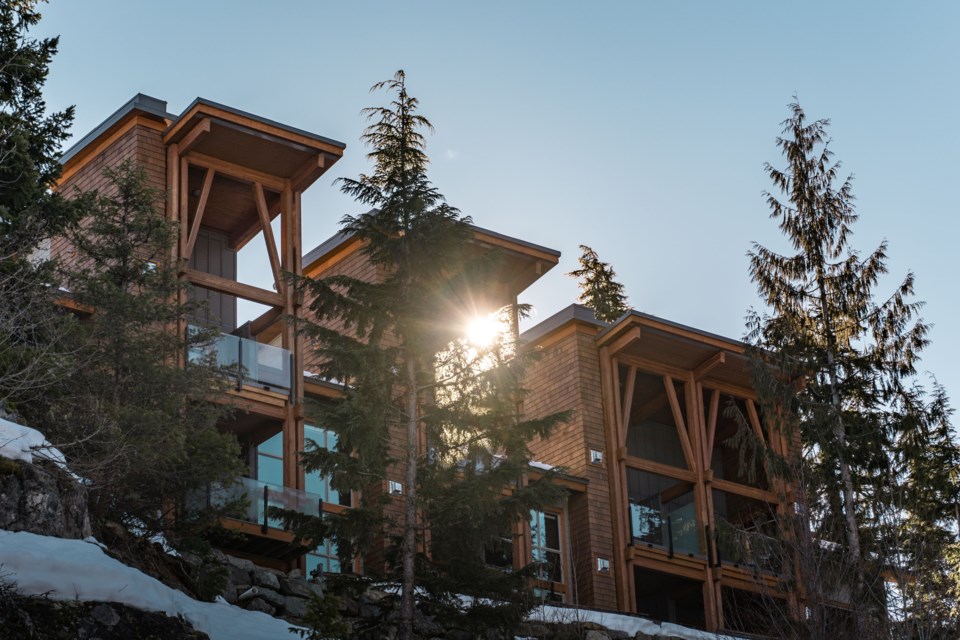A combination of factors, from rising interests rates and cost of living, to this summer’s “unprecedented” wildfire season, has led to a cooling of Canada’s recreational real estate market—and Whistler is no exception, according to a new report.
Released Nov. 29, Royal LePage’s winter recreational property report showed how the country’s most popular ski regions have posted modest year-over-year declines in 2023 as buyer demand continued to soften. Nationally, single-family home prices in Canada’s winter recreational market decreased 0.7 per cent over the first 10 months of the year, to $1,068,200.
“Although recreational real estate markets vary greatly from one region to the next, activity on the whole in Canada’s winter recreational communities has noticeably slowed. Annual sales are down in most regions and inventory has climbed modestly as the market continues to regain balance. This has not, however, translated to steep price declines in a majority of markets,” explained Pauline Aunger, Royal LePage broker of record, in a release.
“Market activity is trending back to historical norms, following an unprecedented boost in activity during the pandemic. In addition to a return to normal work and social routines, today’s elevated interest rate environment has exacerbated this cooldown, as consumers are more concerned about mortgage expenses and the overall economy, including those shopping in high-end recreational markets.”
In Whistler, the median price of a single-family detached home remained flat over the first 10 months of 2023, decreasing 0.4 per cent to $3,632,400. That’s still a smaller decline in single-family home prices than most other B.C. ski resorts, including Revelstoke (-1.1 per cent), Big White (-6.3 per cent), and Sun Peaks (-21.3 per cent). The Mount Washington/Comox Valley area bucked the trend for B.C. ski areas, with single-family home prices rising a whopping 26.5 per cent last year. Provincewide, the median single-family home price for B.C. ski areas declined 1.6 per cent.
The median price of a Whistler condo, meanwhile, increased 3.4 per cent over that span, to $600,000.
Overall, total sales in the resort were down 12.3 per cent year over year.
“Although there are buyers out there, very few people are putting pen to paper at the moment. With all of the conversation around rising interest rates, many consumers—including luxury homebuyers—have temporarily withdrawn from the market and are prepared to wait and see what the Bank of Canada decides to do in December and next year,” said Frank Ingham, associate broker for Royal LePage Sussex.
Prices are expected to rebound somewhat in 2024, with Royal LePage forecasting the median price of a single-family home in Whistler to increase by five per cent.
Although affluent homeowners can more easily absorb increased mortgage costs, Ingham said the full impact of high interest rates likely won’t be felt until between 2024 and 2026, when many five-year mortgages are up for renewal.
Economic uncertainty isn’t the only factor contributing to buyers’ hesitance in Whistler, Ingham noted. After the worst wildfire season in B.C.’s history, prospective buyers are wary of investing in certain recreational markets more prone to disaster.
“In addition to physical dangers, purchasers are concerned over insurance risks,” he posited. “Many insurance policies include a clause which can halt the closing of a property should a wildfire come within a specific radius of the affected home. This policy is pushing some buyers to less disaster-prone markets, and could spell more challenges in the future as wildfires become more frequent.”
According to Royal LePage’s own polling, 24 per cent of recreational market experts reported a decline in buyer demand in 2023 as a result of climate factors or environmental disasters.
View the full report at blog.royallepage.ca.



